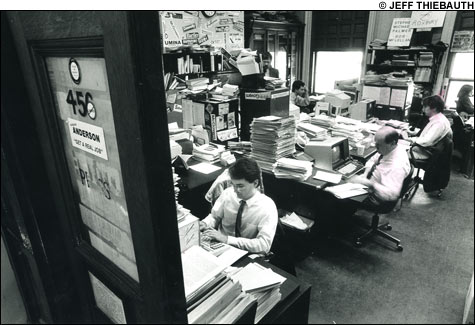
PAPER TRAIL In happier times, the State House Press Room was abuzz with reporters. Today, it's a moribund shell of its former self. |
The ongoing crisis at the Boston Globe shouldn't be troubling just to devotees of the sports pages and "Coupling." Citizens who prize strong coverage of the Massachusetts State House ought to be fretting over the paper's fate, too. With its four-person State House contingent — bureau chief Frank Phillips, reporters Andrea Estes and Matt Viser, and columnist Scot Lehigh — the Globe has a stronger presence under the Golden Dome than any other major Boston media outlet. Recent developments on Beacon Hill, meanwhile, attest to the Globe's efficacy as a watchdog and agenda setter. For example, the Globe's ongoing coverage of public-pension abuse in Massachusetts paved the way for the pension-reform bill that was signed into law this week. And without the Globe's groundbreaking scoops on Sal DiMasi's dubious financial ties to the Canadian software manufacturer Cognos, DiMasi would probably still be Speaker today, rather than facing a federal indictment.So what will happen to State House coverage in general if the New York Times Co. manages to sell the Globe, and the new owner decides to de-prioritize Beacon Hill? Or if ongoing legal wrangling over the recent 23 percent pay cut for members of the Boston Newspaper Guild, the paper's largest union, makes the Times Co. revisit the possibility of closing the paper altogether?
Chasing scandals
Answers to these questions depend, to a large extent, on whether you see the current State House press corps as a) diminished but still robust, or b) as a fatally compromised shadow of its former self. Take the latter tack, as plenty of political veterans do, and it's hard to be optimistic about how State House journalism might weather a reduced Globe presence on the Hill.
"When I started in the State House in March of 1963, there were 35 bodies in the press room," says Peter Lucas, who covered the building for the Globe, the Phoenix, and the Boston Herald. "Now I walk by, and the room is practically empty. It's very sad. . . . When was the last time you saw a roll call [covered by the media]? When's the last time you saw coverage of a debate in the House or Senate?"
A decade or two ago, adds Pam Wilmot, who began representing the good-government watchdog group Common Cause Massachusetts at the State House in 1989, "There were just so many more reporters who covered the State House, in much greater depth. There was a lot of blow-by-blow coverage that helped the public to feel involved, and to get involved." In contrast, Wilmot argues, today's coverage tends to be scandal-driven — which is sometimes warranted (e.g., DiMasi), but also exacerbates public contempt for and disinterest in state government as a whole.
But were things really that much better in the (alleged) good old days? Massachusetts Taxpayers Foundation President Michael Widmer ran communications for former governor Mike Dukakis in Dukakis's first term, and covered state politics for United Press International before that. He longs for the days when the state-budget process was covered in minute detail, in contrast with the broad-stroke treatment used today. But he also recalls trying — and failing — to get the media to cover the de-institutionalization of the state's mentally ill and mentally disabled populations in the late 1970s. "Peter Goldmark [then the secretary of human services] would say to me, 'How come we can't get more coverage?' " recalls Widmer. "And I'd say, 'I know it's good stuff, and I know it's important, but it's kind of boring.' "
Like Widmer, veteran human-services lobbyist Judy Meredith suggests going easy on the sepia. Also in the '70s, she recalls, the sweeping, centralizing restructuring of the Massachusetts court system "was hardly covered. It had profound positive effects on the Commonwealth — but there was no scandal."
More with less?
Even if sexiness trumped substance in the Golden Age of State House coverage, though, the fact remains: there used to be more journalists in the building working to hold wayward politicians' feet to the fire. Now there are fewer — and after the Globe's travails run their course, there could be fewer still. Surely that's not a good thing?
This is a hard point to argue — but Rachelle Cohen, the Herald's editorial-page editor, suggests a caveat worth pondering. In the old days, says Cohen, who covered the State House for the Associated Press and the Herald, "If you wanted to go through campaign contributions, you had to sit there hand-copying everything. Sitting at a computer, using searchable databases, you can now do in the blink of an eye what used to take days. And if you run a newsgathering operation, and know what you're doing, you can do a hell of a lot more with fewer people."